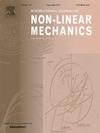Study on nonlinear relaxation properties of composite solid propellant
Abstract
Under large deformations, the nonlinear relaxation properties of composite solid propellants result in significant prediction deviations. In this study, viscoelastic experiments of solid propellants at variable temperatures are conducted. A method for calculating the equal stress derivative in multi-step relaxation test results is proposed to calibrate the proportional relationship of nonlinear relaxation times. The relaxation times increase monotonically with deformation and exhibit a logarithmic evolution law. Under large deformations, the increase of relaxation times slows down. The nonlinear relaxation times are introduced into the thermo-hyper-viscoelastic constitutive model constructed by the generalized Maxwell model and the eight-chain tube model. After calibrating the constitutive model parameters based on experimental results, the accuracy of the constitutive model is verified through double-step relaxation tests on center-holed samples. The incorporation of the nonlinear relaxation times reduces the prediction deviations of composite solid propellants from 11% to 5%. The nonlinear relaxation properties of solid propellants originate from the nonlinearity of moduli and viscosities. The moduli and viscosities exhibit a pattern of initially increasing and then dropping with deformation. The microscopic mechanism involves the time consumption of rearrangement due to heightened friction following deformation, as well as the fracture of the molecular chain under large deformation. The temperatures reduce relaxation times and viscosities by increasing the extensibility of molecular chains.

 求助内容:
求助内容: 应助结果提醒方式:
应助结果提醒方式:


